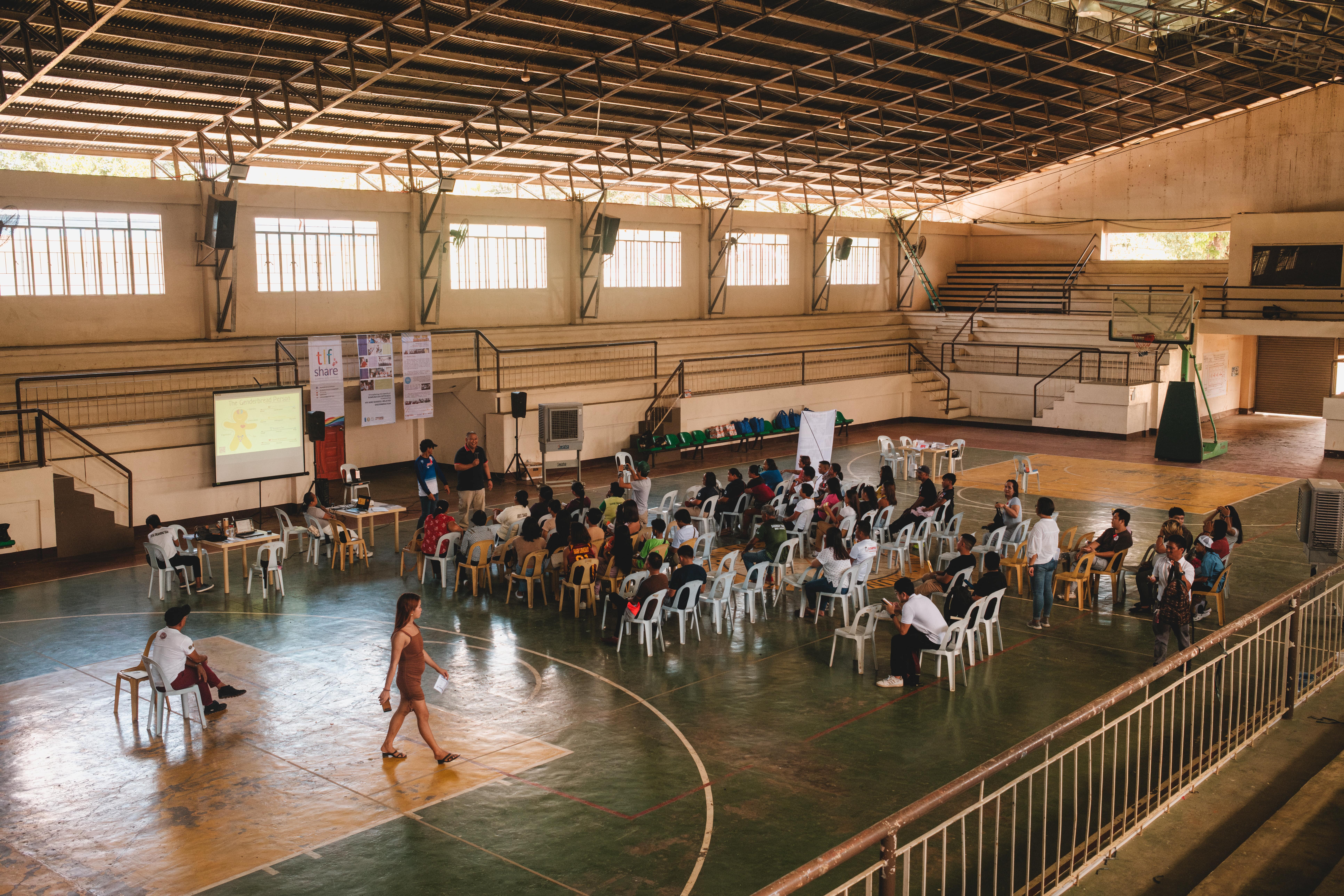by Andyleen Feje, UNDP Philippines HIV Response Analyst
Empowering Local Communities for an Inclusive HIV and Health Response
May 16, 2024

Kim (he/him), community leader and member of DASIG Sumilao Pride, leads the endorsement of the proposed HIV ordinance to the Vice Mayor of Sumilao Local Government Unit and the Municipal Council.
Recent Gains and Milestones
The International Day Against Homophobia, Biphobia and Transphobia (IDAHOBIT) is a worldwide celebration observed annually on 17 May. This year’s theme, “No one left behind: equality, freedom and justice for all,” is a call for solidarity in affirming access to equal rights, opportunities, and protections of all individuals regardless of sexual orientation, gender identity and expression, or sex characteristics.
The path to achieving gender equality and social inclusion still lies far ahead, but we have taken significant strides towards it. In the Philippines, some progress has been made in championing gender equality and social inclusion through the passing of the Safe Streets and Public Spaces Act. This seeks to prevent gender-based sexual harassment from occurring in the streets, schools, workplaces, and even in digital platforms. In June 2024, the launch of Quezon City's Right to Care card marked an important milestone in LGBTQI++ advocacy in the country. The card empowers same-sex couples residing in Quezon City to make healthcare decisions for each other regarding the types of treatments, tests, and prescriptions their partners receive. This shows that local government units can and will strive to be inclusive and gender-responsive, given the right resources and support.
UNDP Initiative and Partnership Project
The United Nations Development Programme (UNDP) in the Philippines recognizes that empowering local actors and advancing inclusive and participatory approaches are important for building resilient and sustainable communities. At the core of UNDP's health response lie two key goals: 1) promoting effective and inclusive governance for health and 2) establishing resilient and sustainable health systems. These efforts include addressing concerns related to HIV/AIDS.

Sensitization training for barangay officials, community leaders, key populations, LGBTQI++ organizations, and parents of persons with diverse SOGIE from barangays Kisolon, Poblacion, San Vicente, and Lupiagan, Sumilao, Bukidnon.
In 2023, under the SCALE Initiative: Removing Barriers to HIV Services, key population-led organizations received grants to implement proposed projects aimed at advancing and reinforcing strategies and tactics to counter discriminatory and punitive laws, policies, and practices in their respective countries. Among the Filipino organization-grantees of the initiative are the TLF Sexuality Health and Rights Educators (SHARE) Collective, a group of peer educators, advocates, and trainers working on sexual health, and rights. With their banner “Empower Local,” TLF SHARE has been instrumental in building the capacity of local communities in sexual health and human rights.

Sumilao, Bukidnon is a 4th class municipality with a population of almost 30,000.
The TLF SHARE project called “Bida ang Barangay” zooms into the critical role of local initiatives in the collective fight against HIV/AIDS. It centers on sensitizing local leaders and barangay officials on SOGIE-SC and HIV-related discrimination. Through the Project, TLF SHARE, in partnership with Kagay-an PLUS - Preserving Life, Uniting Society (PLUS), and Northern Mindanao Advocates Society (NorMA), was able to train around 200 barangay and Sangguniang Kabataan officials, local key population representatives, members of LGBT+ organizations, and parents of persons with diverse SOGIESC from Sumilao, Bukidnon on HIV and anti-discrimination. The sensitization training covered topics such as: 1) Understanding SOGIESC, 2) HIV & AIDS Myths & Facts and HIV Situation, 3) Salient Features of the HIV Policy Act of 2018, and 4) Salient Features of the Safe Spaces Act. Participants were provided with free condoms, lubricants, and HIV testing services at the venue. Under the Project, 61 residents of Sumilao have undergone free HIV testing. The sensitization training also served as an avenue for community members to share stories of stigma and discrimination experienced by Persons Living with HIV (PLHIV) and persons of diverse SOGIESC, and to discuss concrete actions to address these issues.

HIV Testing in Barangay Vista Villa Sumilao, Bukidnon during the Sensitization Training.
To cover all 10 barangays in Sumilao, Bukidnon, the training ran from 7-11 May 2024. On the last day of the training, DASIG Sumilao Pride, an LGBT coalition, endorsed a proposed HIV ordinance to the Municipal Council led by Sumilao Vice Mayor George Jeremy Baula. The proposed ordinance is the result of a series of consultations and coordination activities supported by TLF SHARE. It is tailored to the realities and needs of the communities in Sumilao, Bukidnon. The Municipal Council pledged to prioritize and pass the ordinance.
Partnership and Collaboration
The gains of Bida and Barangay are just some examples of what we can achieve when we pool our expertise and resources together. The key component of this project is its emphasis on partnership and collaboration. By bringing together civil society organizations, particularly key population-led organizations, local government, and affected communities, a unified front against HIV stigma is forged. The project will conclude in August 2024, but its impact will endure. As barangay officials and community leaders become champions of HIV awareness and inclusion, they inspire others to follow suit. Communities become safer, more supportive spaces for PLHIV and persons of diverse SOGIE, empowering individuals to seek the services and support they need without fear of discrimination.
In effect, sensitizing goes beyond mere knowledge transfer; it's about building allies that have the power to transform lives. As we commemorate IDAHOBIT and reaffirm our commitment to LGBTQ++ rights and health equity, let us recognize the vital role of key population-led organizations, local government, and local communities in this journey. By investing in these partnerships and initiatives, we take a crucial step towards a future where HIV is no longer accompanied by stigma, and everyone, regardless of their HIV status or SOGIE, can live a life of dignity and respect.
For more information about the International Day Against Homophobia, Biphobia and Transphobia, read here.

 Locations
Locations



